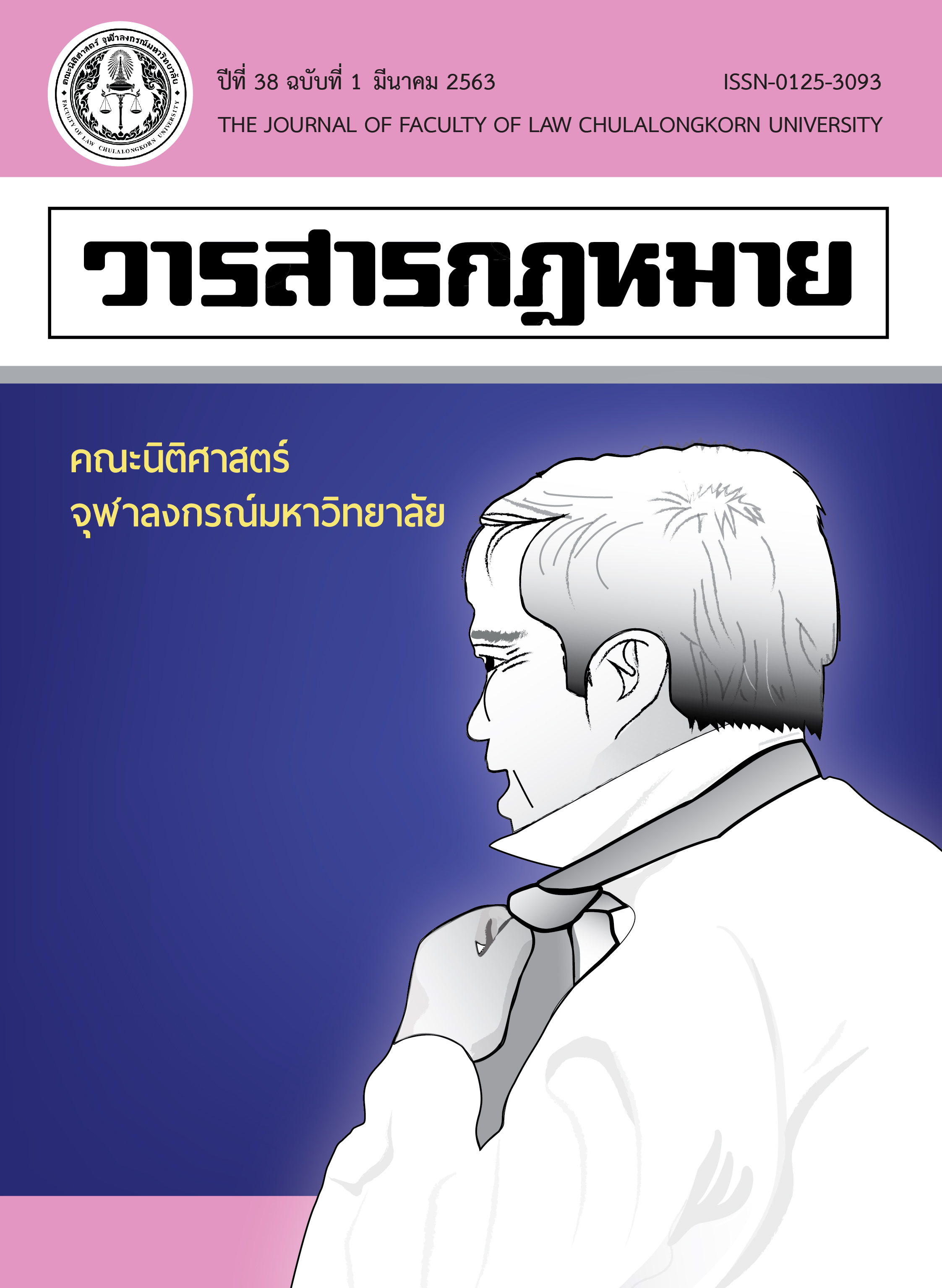ปัญหาบางประการเกี่ยวกับการอุทธรณ์โต้แย้งคำวินิจฉัยไม่รับจดทะเบียนเครื่องหมายการค้าของคณะกรรมการเครื่องหมายการค้า
Main Article Content
บทคัดย่อ
การจดทะเบียนเครื่องหมายการค้าเป็นกลไกสำคัญในการให้ความคุ้มครองตามกฎหมายอย่างเต็มรูปแบบแก่เครื่องหมายการค้า ซึ่งเป็นปัจจัยสำคัญประการหนึ่งในการประกอบธุรกิจ โดยทั่วไป หากเครื่องหมายการค้ามีลักษณะอันพึงรับจดทะเบียนได้ นายทะเบียนเครื่องหมายการค้าก็พึงมีคำสั่งรับจดทะเบียนเครื่องหมายการค้าดังกล่าว แต่หากนายทะเบียนมีคำสั่งปฏิเสธไม่รับจดทะเบียน พระราชบัญญัติเครื่องหมายการค้า พ.ศ. 2534 ก็บัญญัติให้สิทธิผู้ขอจดทะเบียนไว้อย่างชัดแจ้งว่าสามารถอุทธรณ์โต้แย้งคำสั่งดังกล่าวต่อคณะกรรมการเครื่องหมายการค้าได้ แต่ให้คำวินิจฉัยของคณะกรรมการเครื่องหมายการค้านั้นเป็นที่สุด กรณีจึงมีปัญหาว่าหากผู้ขอจดทะเบียนยังคงไม่พอใจในผลของคำวินิจฉัยของคณะกรรมการ ผู้ขอจดทะเบียนจะยังสามารถอุทธรณ์โต้แย้งคำวินิจฉัยดังกล่าวโดยการฟ้องคดีต่อศาลได้หรือไม่ และศาลใดจะเป็นศาลที่มีอำนาจในการพิจารณาพิพากษาคดีดังกล่าว เมื่อปัญหาเช่นว่านี้ขึ้นสู่การพิจารณาของศาลฎีกาและคณะกรรมการวินิจฉัยชี้ขาดอำนาจหน้าที่ระหว่างศาล จึงนำมาสู่ข้อยุติในทางปฏิบัติว่า ที่กฎหมายบัญญัติให้คำวินิจฉัยของคณะกรรมการเครื่องหมายการค้าเป็นที่สุดนั้นหมายถึงเฉพาะคำวินิจฉัยที่ชอบด้วยกฎหมายเท่านั้น ผู้ขอจดทะเบียนย่อมมีสิทธิฟ้องคดีต่อศาลเพื่อขอให้ศาลมีคำพิพากษาเพิกถอนคำวินิจฉัยที่ไม่ชอบด้วยกฎหมายได้ โดยศาลทรัพย์สินทางปัญญาและการค้าระหว่างประเทศเป็นศาลที่มีเขตอำนาจเหนือคดีลักษณะดังกล่าว แต่แนวการตีความเช่นว่านี้อาจไม่สอดคล้องกับตัวบทกฎหมายที่มีผลใช้บังคับอยู่ในปัจจุบันเท่าใดนัก ทั้งยังอาจก่อให้เกิดปัญหาตามมาอีกหลายประการ
Article Details
ลิขสิทธิ์และเนื้อหาในเว็บไซต์ของวารสารกฎหมาย (รวมถึง โดยไม่จำกัดเฉพาะ เนื้อหา รหัสคอมพิวเตอร์ งานศิลป์ ภาพถ่าย รูปภาพ ดนตรีกรรม โสตทัศนวัสดุ) เป็นกรรมสิทธิ์ของวารสารกฎหมาย และผู้ได้รับการโอนสิทธิทุกราย
1. วารสารกฎหมาย ให้อนุญาตให้คุณใช้สิทธิอันไม่เฉพาะเจาะจงที่สามารถถูกถอนเมื่อใดก็ได้ โดยไม่มีค่าใช้จ่าย ในการ
- เยี่ยมชมเว็บไซต์และเอกสารในเว็บไซต์นี้ จากคอมพิวเตอร์หรือเครื่องมือสื่อสารผ่านเว็บบราวเซอร์
- คัดลอกและจัดเก็บเว็บไซต์และเอกสารในเว็บไซต์นี้บนลงคอมพิวเตอร์ของคุณผ่านระบบความจำ cache
- สั่งพิมพ์เอกสารจากเว็บไซต์นี้สำหรับการใช้ส่วนตัวของคุณ
- ผลงานที่ได้รับการตีพิมพ์โดยวารสารกฎหมาย จุฬาลงกรณ์มหาวิทยาลัย ถูกคุ้มครองภายใต้ Creative Commons Attribution 4.0 International License ซึ่งอนุญาตให้ทุกคนสามารถคัดลอก แจกจ่าย ดัดแปลง ส่งต่อ ผลงานได้ ก็ต่อเมื่อผลงานและแหล่งข้อมูลได้รับการอ้างอิงอย่างเหมาะสม
2. วารสารกฎหมาย จุฬาลงกรณ์มหาวิทยาลัย สงวนสิทธิ์ไม่อนุญาตให้คุณใช้สิทธิอื่นใดที่เกี่ยวข้องกับเว็บไซต์และเอกสารบนเว็บไซต์นี้ เช่น การคัดลอก ดัดแปลง เปลี่ยนแปลง ส่งต่อ ตีพิมพ์ แจกจ่าย เผยแพร่ จัดแสดงในที่สาธารณะ ไม่ว่าจะในรูปแบบใดก็ตาม ซึ่งเว็บไซต์หรือเอกสารบนเว็บไซต์ โดยไม่อ้างอิงถึงแหล่งข้อมูลหรือโดยไม่ได้รับอนุญาตเป็นลายลักษณ์อักษรจากวารสารกฎหมาย จุฬาลงกรณ์มหาวิทยาลัย
3. คุณอาจขออนุญาตที่จะใช้เอกสารอันมีลิขสิทธิ์บนเว็บไซต์นี้โดยการเขียนอีเมลล์มายัง journal@law.chula.ac.th
4. วารสารกฎหมาย จุฬาลงกรณ์มหาวิทยาลัย เข้มงวดกับการคุ้มครองลิขสิทธิ์อย่างมาก หากวารสารกฎหมาย จุฬาลงกรณ์มหาวิทยาลัยพบว่าคุณได้ใช้เอกสารอันมีลิขสิทธิ์บนเว็บไซต์นี้โดยไม่ถูกต้องตามการอนุญาตให้ใช้สิทธิ ดังที่กล่าวไปข้างต้น วารสารกฎหมาย จุฬาลงกรณ์มหาวิทยาลัยอาจดำเนินคดีตามกฎหมายต่อคุณได้ เพื่อเรียกร้องค่าเสียหายที่เป็นตัวเงินและคำขอชั่วคราวให้คุณหยุดการใช้เอกสารดังกล่าว ทั้งนี้ คุณอาจถูกสั่งให้ชดใช้ค่าใช้จ่ายใดๆ ที่เกี่ยวข้องกับการดำเนินการตามกฎหมายนี้
หากคุณพบเห็นการใช้เอกสารอันมีลิขสิทธิ์ของวารสารกฎหมาย จุฬาลงกรณ์มหาวิทยาลัย ที่ขัดหรืออาจขัดต่อการอนุญาตให้ใช้สิทธิดังที่ได้กล่าวไปข้างต้น โดยเชื่อว่าได้ละเมิดลิขสิทธิ์ของคุณหรือของผู้อื่น สามารถร้องเรียนมาได้ที่ journal@law.chula.ac.th


